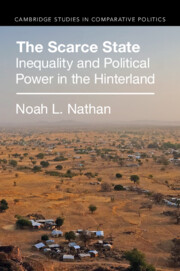
- Cited by 4
-
Cited byCrossref Citations
This Book has been cited by the following publications. This list is generated based on data provided by Crossref.
Tutumlu, A. and Imyarova, Z. 2023. ECONOMIES OF CONFLICT: CONTEXT AND ROOT CAUSES OF INTERCOMMUNAL CONFLICTS IN KAZAKHSTAN. Central Asian Economic Review, p. 66.
Zhang, Hao and Zhang, Ye 2023. Strong State, Weak Enforcement: Bureaucratic Forbearance and Regressive Consequences of China's Social Insurance Policies. SSRN Electronic Journal,
Cohen, Isabelle 2024. Documenting Decentralization: Empirical Evidence on Administrative Unit Proliferation from Uganda. The World Bank Economic Review,
Gallagher, Janice K. Kruks-Wisner, Gabrielle and Taylor, Whitney K. 2024. Claim-Making in Comparative Perspective.
- Publisher:
- Cambridge University Press
- Online publication date:
- February 2023
- Print publication year:
- 2023
- Online ISBN:
- 9781009261111




